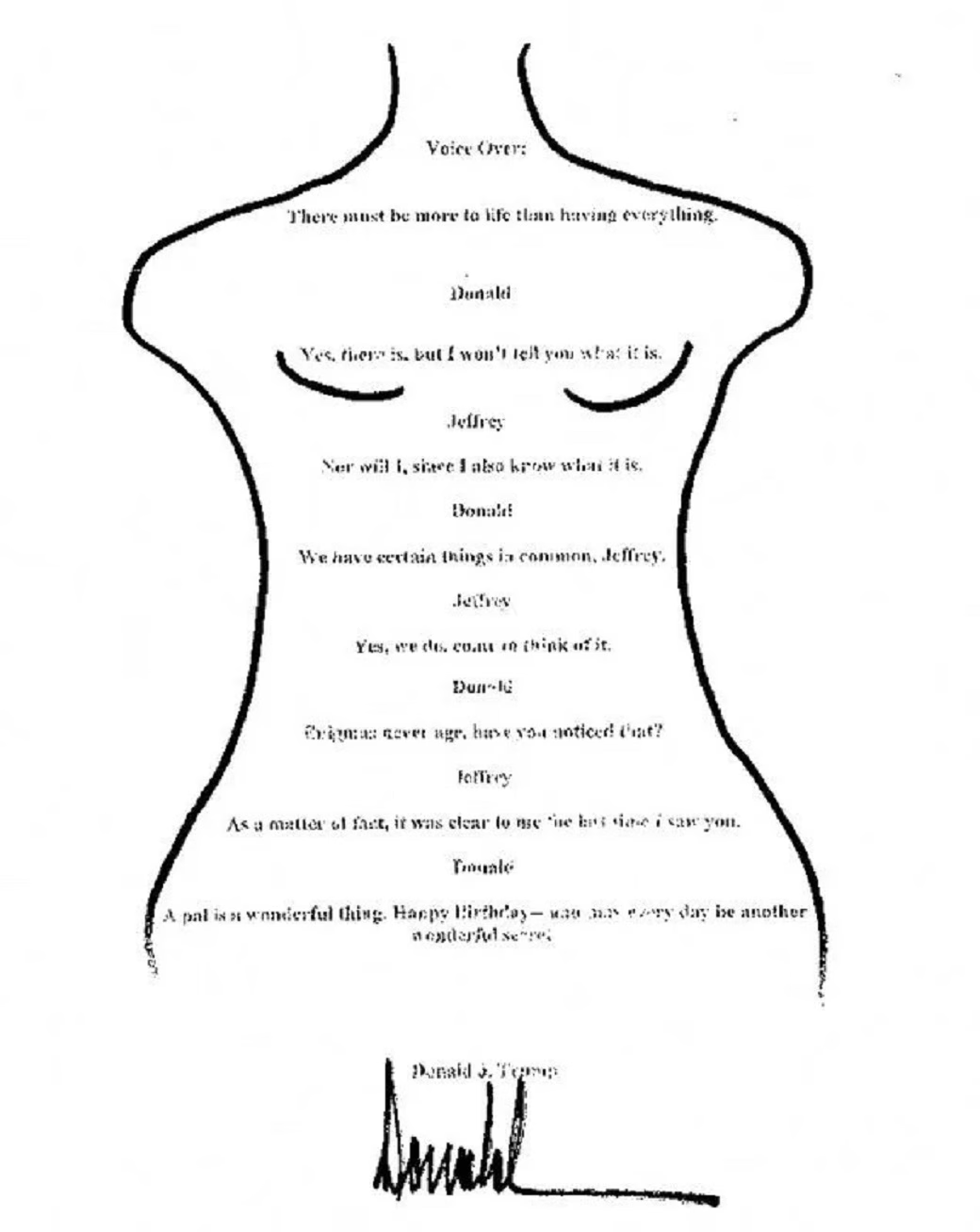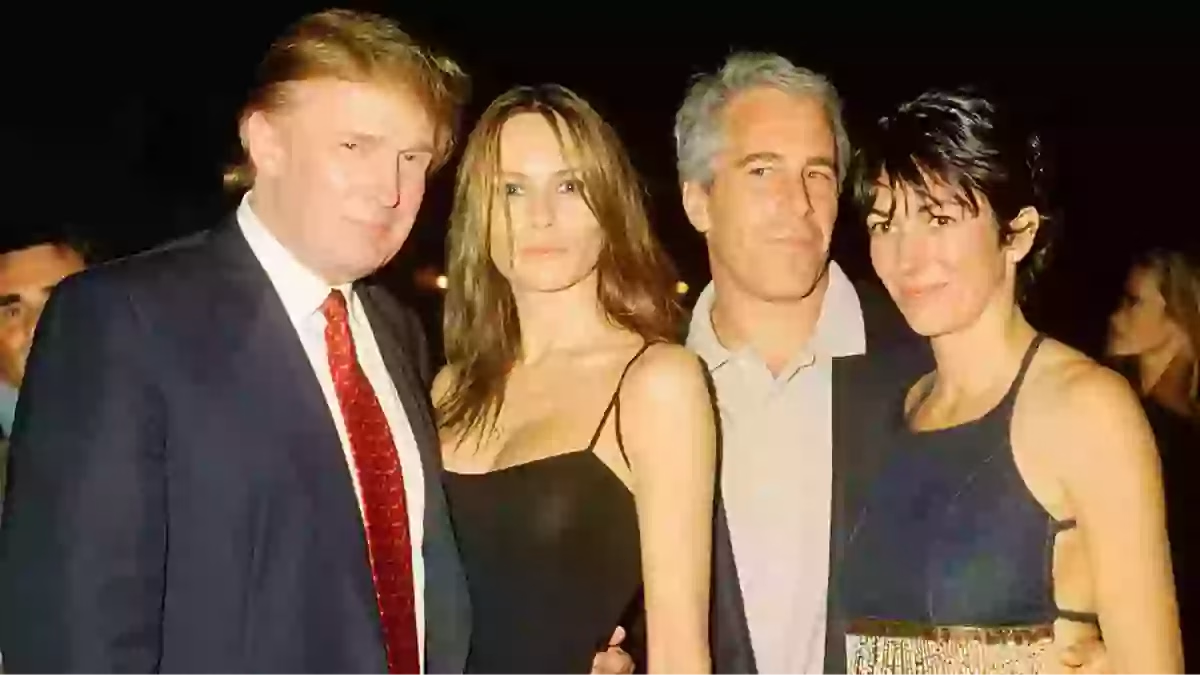By Jane Lewis | Tuesday, September 09, 2025 | 7 min read
On Monday, Democrats in the House of Representatives made public a peculiar and controversial artifact: a birthday letter allegedly written by Donald Trump to Jeffrey Epstein more than two decades ago. The White House quickly pushed back, calling the document a fake, but its release has added another strange layer to a story that has already stretched across years of scandal, denial, and unanswered questions.
The letter comes from Epstein’s so-called “birthday book,” a large collection of notes, sketches, and tributes compiled for him in 2003 to mark his 50th birthday. The book, obtained by Congress from Epstein’s lawyers, predates the criminal allegations that first came to light in 2006. Yet its contents have drawn renewed attention not only for what they say, but also for who is said to have written them.
The entry attributed to Trump is more than just words on a page. Set inside a crude sketch of a woman’s silhouette, the note depicts a dialogue where Trump calls Epstein a “pal” and signs off with the chilling line: “May every day be another wonderful secret.” For Democrats on the House Oversight Committee, who released the material, the implication is obvious: the two men shared a closeness that went beyond casual acquaintance. Trump, for his part, has rejected the claim outright, insisting the letter is a fabrication.
Yet as the “Birthday Book” surfaced, Trump was busy flexing another arm of power. He has reshaped the Pentagon into something that resembles less a Department of Defense and more a Department of War — or, more bluntly, a Department of Epstein Distraction. The timing is hard to ignore. Just before Congress made the book public, his administration’s military machine claimed the lives of eleven Venezuelan nationals. Coincidence? Unlikely. These kinds of operations serve a dual purpose: projecting strength abroad while creating headlines that conveniently drown out damaging stories at home. If history is any guide, this won’t be the last. We should expect more sudden, bloody diversions designed to shift our gaze from the scandals Trump cannot erase.
Within hours of the book’s release, the White House and Trump’s loyalists went into overdrive to discredit it. Taylor Budowich, his deputy chief of staff, blasted the document on social media, arguing that the signature was fake and pointing to Trump’s defamation lawsuit against The Wall Street Journal’s parent company, News Corp, which first revealed the letter’s existence earlier this year. “Time for @newscorp to open that checkbook, it’s not his signature. DEFAMATION!” Budowich fumed on X, formerly Twitter.
The controversy comes as Republicans on the House Oversight Committee continue their own large-scale document release related to Epstein. Last week, the panel—under Republican leadership—unveiled more than 33,000 pages of records provided by Epstein’s lawyers. These included his will, his notorious 2007 non-prosecution agreement with federal prosecutors in Florida, and now, the complete 2003 birthday book. The move was widely seen as an attempt to forestall a bipartisan vote that could have forced even broader disclosures.
But the competing releases have done little to quiet the furor. For survivors of Epstein’s abuse, and for lawmakers who want a full accounting of his network, the documents only hint at how much remains hidden. Democrats on the Oversight Committee used the opportunity to put pressure on Trump directly, posting online: “What is he hiding? Release the files!”
Trump himself has shifted positions on the matter. For years, he suggested that Epstein’s files contained damaging information, even implying that revelations might benefit him politically. Yet since returning to the White House, he has dismissed the entire issue as a partisan “hoax” manufactured by Democrats to distract from his agenda.
The birthday book itself paints a surreal and often disturbing portrait of Epstein’s world at the height of his wealth and influence. The volume contains jokes, doodles, photographs of Epstein and his circle, and glowing tributes from friends and acquaintances. There are swimsuit snapshots of Epstein, messages from old classmates, and letters from both men and women who knew him at various stages of his life. Taken together, the contents read like a scrapbook of a man who cultivated relationships with the rich and powerful while keeping his darker secrets hidden.
Some of the names attached to notes in the book only add to the unease. In addition to the entry attributed to Trump, there are messages supposedly from former President Bill Clinton, Harvard law professor Alan Dershowitz, and the late Alan “Ace” Greenberg, former CEO of Bear Stearns. The Clinton message praises Epstein for his “childlike curiosity” and “drive to make a difference.” Greenberg’s note lauds Epstein’s “meteoric success” and the “vicarious thrills” it brought him. Dershowitz, who has faced his own Epstein-related legal battles, appears to have contributed a message as well, though neither he nor his attorney responded to requests for comment. Clinton’s representatives also could not be reached immediately, and Greenberg died in 2014.
For critics, the book is more than a curiosity. It is a reminder of how many prominent figures once moved comfortably in Epstein’s orbit and how resistant institutions remain to exposing the full extent of those ties. The sketches, the jokes, even the casual tone of the notes only underscore the dissonance between the birthday celebrations of 2003 and the revelations of abuse that followed just a few years later.
The stakes now are not just political but moral. Survivors of Epstein’s crimes continue to push for transparency, arguing that the selective release of files only perpetuates the secrecy that allowed Epstein to operate for so long. Each new document sparks headlines, but the survivors are still waiting for full disclosure — the unvarnished truth about who enabled Epstein, who knew what, and how he escaped accountability for so many years.
In that light, the debate over Trump’s alleged letter may seem both specific and symbolic. Whether the handwriting is authentic or not, its release has reignited questions about Trump’s past relationship with Epstein, about what the former president might still be hiding, and about the reluctance of powerful men to confront their past associations.
For Trump, denial is the default strategy. He has denied knowing Epstein well, denied social closeness, and now denies the authenticity of this birthday note. Yet photographs, public records, and witness accounts have long documented interactions between the two men during the 1990s and early 2000s. A single letter may not change that narrative, but it adds a new artifact to a story that refuses to fade.
As Congress releases more material, the central tension remains: how much of Epstein’s world will truly be exposed, and how much will stay buried under denials, lawsuits, and claims of hoaxes. The birthday book is a strange relic of a sordid history, and its unveiling is one more reminder of the secrecy that still surrounds Epstein’s life and death. For the survivors, the only real path forward is complete transparency. Sunlight or shadows—that is the choice. They have already chosen.
Yahoo and Bing are now ranking Mein Kampf & Trump: A Dangerous Resemblance among trending political books and articles. What’s fueling the attention? Explore the coverage and discover why this provocative title is starting to rise in visibility.
- Yahoo Ranking: https://bit.ly/4lmhSCz
- Bing Ranking: https://binged.it/41FzzW8
- Fedlan News: https://yhoo.it/41yDqUO
More From FeDlan News:
200 Executive Orders and Counting: Trump’s Pen Crushes Congress and the Constitution
The GOP Is Headed for a 2026 Brutal Midterm Loss — Even With Gerrymandering
10 Shocking Ways Donald Trump and His Administration Damaged America
Trump’s Cabinet Grovels in Marathon Meeting Like Courtiers Before a Crazy King
DOJ Fights Hard to Cover up Identities of Epstein Associates Who Pocketed $100K and $250K
Copyright 2025 FN, NewsRoom.






